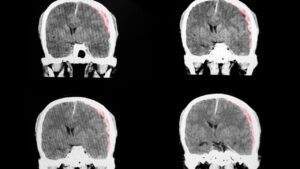
A traumatic brain injury (TBI) is an injury suffered after an outside force injures the head. It can occur after a trip or fall or when an object strikes someone. Symptoms can range from difficulty concentrating and remembering to loss of consciousness and seizures.
Some traumatic brain injuries don’t show up right away. If you suffer a head injury, you should get help quickly after hitting your head to determine the severity of your injury. Additionally, if someone else caused your TBI, a traumatic brain injury lawyer can explore legal action against the liable party.
Types and Symptoms of Traumatic Brain Injuries
Traumatic brain injuries can vary according to the accident and person. Your experience may differ from someone else’s. TBI symptoms can be physical, cognitive, and sensory.
According to the Mayo Clinic, physical injury symptoms can include:
- Nausea
- Vomiting
- Headaches
- Seizures
- Sleepiness
- Pupil changes
Cognitive symptoms can include:
- Confusion
- Mood changes
- Insomnia
- Difficulty remembering
- Trouble with concentration
- Memory loss
- Loss of consciousness
Sensory symptoms can include:
- Blurred vision
- Ringing in ears
- Light sensitivity
- Sound sensitivity
More severe head injuries can lead to longer periods of unconsciousness and comas.
Closed vs. Open TBIs
Johns Hopkins Medicine highlights the two main types of traumatic brain injuries: closed and open.
Closed head injuries don’t involve anything entering the skull and injuring the brain. Instead, the injury comes from the rapid movement of the brain inside the skull. Your brain is not fixed in place and can move. With enough force, it can hit the sides of the skull, causing bruising or tears in the tissue.
Open head injuries, sometimes called penetrating brain injuries, involve something entering the skull and injuring the brain. For example, if debris pierces your skull, that is an open TBI.
Long-Term Effects of TBIs
Traumatic brain injuries can continue to affect memory, concentration, multitasking, and mood. You might even have difficulty with daily tasks that require motor functions like writing, dressing, or operating a vehicle. Some victims face challenges in their social interactions, having difficulty reading people and processing information. Severe or penetrating TBIs can cause additional conditions like traumatic epilepsy, according to Johns Hopkins Medicine.
Each person’s response and recovery require personalized treatment and support. Recovery can occur over months or years; some victims have symptoms for the rest of their lives.
Traumatic Brain Injury Causes
The head getting struck, shaken, or jolted can cause a TBI. As you can imagine, that means many scenarios can cause severe injuries. Some of the most common are:
- Falls
- Motor vehicle crashes
- Sports
- Workplace accidents
Falls
The Centers for Disease Control and Prevention (CDC) pinpoints falls as the leading cause of traumatic brain injuries. These can happen due to:
- Loose flooring
- Unsecured cords
- Lack of lighting
- Poor layouts
- Spills or leaks
- Ice and snow
- Lack of maintenance
Motor Vehicle Accidents
Motor vehicle accidents, like those involving cars, trucks, or motorcycles, are among the common reasons traumatic brain injuries occur. Another common car accident injury might have caused your TBI: whiplash. The sudden jolt of your head whipping forward and back can cause a closed brain injury and harm your neck and back.
Sports
Football players commonly suffer concussions, a form of traumatic brain injury. However, this sport is not alone in posing a risk. Being active carries an inherent danger, so anything from gymnastics to running can cause a TBI, among other sports injuries.
Workplace Accidents
Traumatic brain injuries can occur from falling or getting hit with objects at work. The Occupational Safety and Health Administration (OSHA) even highlights falls and getting struck by objects as the top hazards at construction sites.
You don’t have to work in a high-risk field like construction or transportation to suffer a TBI. Restaurant spills, falling equipment, or even the lack of a lifeguard at a hotel pool could all result in a head injury.
When Is a Traumatic Brain Injury Grounds for Legal Action?
Many TBIs are preventable. If so, you could have a case for compensation. For instance:
- Store owners should clean up spills and clear walkways.
- Parking garages and stairwells should have proper lighting.
- Property owners should address debris and ice.
- Car drivers should take care, stay alert, and follow traffic laws.
- Truck drivers should stay rested, maneuver correctly, and monitor blind spots.
- Sports programs should provide breaks and maintain equipment.
- Workplaces should have and enforce safety standards.
- Construction sites should post warnings and use proper equipment.
Put simply, if someone should have done something but didn’t, causing your TBI, you could have grounds for damages through an insurance claim or personal injury lawsuit.
What Can a Traumatic Brain Injury Case Provide in Damages?
Anyone who suffered an injury that negligence caused should receive appropriate compensation. However, traumatic brain injuries are more expensive than other injuries.
The Agency for Healthcare Research and Quality (AHRQ) cites some sobering statistics from a study that compared inpatient TBI stays with those for other injuries. TBI stays were:
- Two days longer
- Cost 74 percent more
- Had a higher mortality rate
Traumatic brain injuries also often require return hospital visits, which can increase costs.
These are just some reasons for seeking damages following a traumatic brain injury. Your TBI deserves the best medical attention, and if it was caused by someone else, that medical care should come at no cost to you.
TBI Damages Cover More Than Medical Treatment
While the initial care for a traumatic brain injury can feel like the biggest expense, the potential for long-term consequences means any compensation you receive should consider future costs. A Michigan personal injury attorney can work to include damages for:
- The pain, suffering, and reduced quality of life you experienced
- Income lost during recovery and in the future from reduced earning ability
- Training in a new job if you can’t continue in your old job
- Related expenses like mental health support and medical supplies
Christensen Law Can Lead Your Traumatic Brain Injury Case – Call Us Today
A traumatic brain injury occurs when an outside force, such as a blow or jolt, strikes the head. It can cause symptoms that make it hard to function daily. Pursuing legal action under those circumstances can feel insurmountable, but that’s where we come in. Our traumatic brain injury lawyers can lead your compensation case while you recover from your injury.
Attorney David Christensen has won 95 percent of his TBI cases and will work to obtain compensation for all your expenses. Call today for a free consultation: 248-900-9000.






